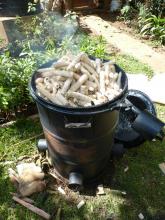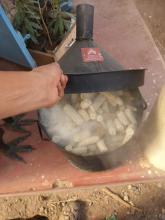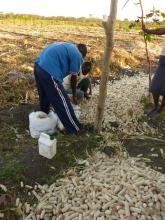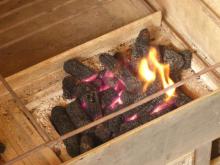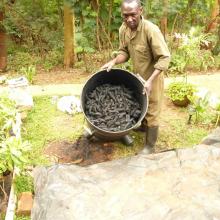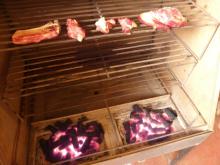The Kitengela Arboretum Promoting sustainable agro-energy technologies and conservation education. Kenya Seeds of Change An initiative contributing towards national afforestation through direct seeding of woodlots. Concept Compiled by: Teddy M. Kinyanjui Sustainability Consultant Kitengela Arboretum Po. Box 23058 Lower Kabete Nairobi, Kenya. April 2009
**Kenya Seeds of Change**
*Overview*
The degraded state of Kenya’s national and private forests (and therefore, the overall environmental health of the country) borders on the point of no return. Unless large scale forestry efforts are undertaken by both the public and private sector in the next few years, the damage that has been done to the countries forests will become irreversible. Due to the slow pace of natural regeneration of forests (as compared to their exploitation), a boost is sorely needed to meet current and future demands by Kenya’s ever growing population for sustainably grown wood by-products, especially the charcoal and firewood that is used daily by 80% of the country’s population.
The Kenya Seeds Of Change initiative aims to contribute towards national afforestaion by land owners through the countrywide sales of inexpensive tree seeds and the promotion of direct seeding woodlot establishment. Seeds are by far the best method of promoting wide scale tree planting in Kenya. These are some of the benefits from the direct planting of tree seeds compared to planting seedlings:
- Seeds are Cheaper! (At roughly 0.25cents per tree compared to 20+ shillings per seedling)
- The tree’s hardiness and survivability increases.
- Thousands of seeds can be transported and stored much more easily then thousands of seedlings can until the planting time comes.
- Seeds can be massively disseminated through existing retail outlets with minimal price increments from producer to consumer. Tree seedlings face problems of availability at the right time, dissemination logistics etc.
- Partially domesticated indigenous tree species are best grown from seed. They are already adapted to Kenya’s climate, soils and pests and the trees are currently widely used and understood by the population.
- Seeds simplify the enhancement of the genetic diversity of planted woodlots.
- The above/below ground biomass ratio is more conducive to healthy growth when a tree is planted from seed.
- Overall financial losses and risks from drought, animals etc. are significantly less under direct seeding.
Limited Access to Good Seed
- From large commercial plantations to small scale rural and urban farmers, the access to purchase certified tree seeds according to their growing zones and uses is extremely limited to anyone who would like to plant trees.
- Currently the only place to buy graded, certified tree seeds is at KEFRI (The Kenya Forestry Research Institute), located in Muguga, on the outskirts of Nairobi.
- In contrast all the Nakumatt and Uchumi supermarket chains and all of the Agro-Vets in small or large towns and cities stock a variety of seeds ie. sukuma wiki (Kale) and maize etc.
- Which of course raises the question; why don’t they all stock small packages of tree seeds that are suited to their market base?
This is what the Kenya Seeds of Change initiative has been started to get done.

